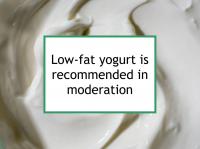Yogurt is made by adding bacterial cultures to milk, fermenting it. Fermentation of lactose (milk sugar) converts it into lactic acid, which gives yogurt its slightly sour taste. Yogurt is an excellent dietary source of conjugated linoleic acid (CLA), a very good source of iodine, a good source of calcium, and also contains some riboflavin and vitamin B12.
Consumption of yogurt has been shown to improve cholesterol profile. Yogurt's calcium content may help it prevent bone loss. Intake of yogurt has been found to be associated with lower risks of colorectal and bladder cancer. On the other hand, some (but not all) studies have reported that yogurt consumption is associated with an increased risk of kidney cancer and squamous cell skin cancer.
Breast cancer-related effects of eating yogurt
Prospective and case-control studies conducted in the U.S., France and Sweden have reported that yogurt consumption is associated with reduced risk of breast cancer. One Swedish study found that relatively high long-term consumption of fermented dairy products was associated with reduced risk of hormone receptor negative (ER-/PR-) breast cancer. A 2021 meta-analysis of data from previous studies reported that higher yogurt consumption was associated with lower risk of ER- breast cancer. Low-fat yogurt has been reported to have more favorable effects than full-fat yogurt, although such yogurt incorporates less CLA.
The anti-breast cancer properties of yogurt appear to derive primarily from it's CLA content and the fact that it is a fermented food. These appear to outweigh the possible cancer-promoting activities of milk, a food which incorporates both beneficial and potentially harmful compounds.
Conjugated linoleic acid (CLA) may inhibit BC
Yogurt is an excellent source of CLA, a fatty acid found primarily in dairy foods and meat. CLA has been demonstrated to inhibit breast cancer in the laboratory at concentrations equivalent to human consumption levels. CLA has been shown to induce apoptosis of both estrogen receptor positive (ER+) and estrogen receptor negative (ER-) breast cancer cells and to reduce mammary tumor size and incidence. CLA has also been reported to alter estrogen receptor transcriptional activities and inhibit cancer cell adhesion and migration.
Study results concerning CLA in human populations have been contradictory. For example, a Finnish study of women who already had breast cancer found that dietary CLA and levels of CLA in the blood were significantly lower in the postmenopausal breast cancer cases than in the postmenopausal controls without cancer. However, a large prospective Netherlands population study found a weak positive association between CLA intake and the risk breast cancer (i.e., the association was in the opposite direction expected if CLA was protective) and concluded that the apparent anticarcinogenic properties of CLA in animal and tissue culture models had not been confirmed in humans.
Yogurt may improve gut microbial profile
Recent research suggests that microorganisms found within the gut, and gut microbial imbalances in particular, may influence breast cancer risk and development. The gut microbiome (the complete sets of genes or genetic material present in the microorganisms) incorporates more than 3.3 million genes, most of whose functions have not been determined. Gut microorganisms (including bacteria, viruses, fungi and other microbes) function as symbionts, providing beneficial functions such as nutrient and drug metabolism and protection against pathogens to their human hosts. The gut microbiome can evolve rapidly under the pressure of changing environmental factors, and is influenced by factors such as antibiotic use, obesity and diet.
Vegetarian diets and diets characterized by high consumption of animal fats or fiber each have been shown to associated with distinct patterns of gut microbiota composition. Intestinal microbes have been shown to have a role in the regulation of estrogen metabolism and links between altered gut microbiome and breast cancer have been reported.
In one study, mice genetically susceptible to mammary tumors were fed a Westernized diet associated with increased mammary carcinogenesis. Development of mammary tumors was shown to be inhibited by the regular addition of Lactobacillus reuteri in the animals' drinking water. This outcome was determined to be a result of microbially-triggered lymphocytes. In other words, Lactobacillus reuteri generated a host immune response that inhibited tumor progression in the mammary glands, a distant tissue.
There is some evidence that unfavorably altered gut microbiomes may reduce the effectiveness of chemotherapy.
There appear to be multiple pathways by which fermented foods can potentially reduce breast cancer risk and progression through the gut microbiome. The mechanisms are not well understood and the effects of yogurt may be modest.
Additional comments
Greek yogurt has favorable profile
Greek yogurt is yogurt that has been strained, which removes some of the whey and renders it thicker than regular yogurt. Greek yogurt has more CLA, protein and vitamin B12 and less calcium and natural sugar than regular yogurt. As such, Greek yogurt appears to have a somewhat more favorable profile overall than regular yogurt. Both regular and Greek yogurt that is made from milk from grass-fed cows have higher levels of CLA and vitamin B12 and more favorable omega-6 to omega-3 fatty acid profiles than milk from cows fed primarily grain.
Avoid yogurt with carrageenan or high added sugar
Yogurt brands that list carrageenan (a breast carcinogen) as an ingredient should be avoided. Algae-derived carrageenan has been shown to have anticancer properties, however the chemical modifications used to convert carrageenan for use as a thickener in products such as yogurt have been reported to make it harmful.
Yogurt, including low-fat yogurt, organic, Greek yogurt and yogurt "made with real fruit," can incorporate high levels of added sugar. Such yogurt should also be avoided.
Kefir is more chemopreventive than yogurt
While yogurt appears to have some ability to protect against breast cancer, kefir (a fermented milk drink) has been shown to have stronger effects at lower concentrations. Kefir is made using kefir grains, which consist of a complex living culture of yeasts and bacteria, whereas yogurt typically is made using only lactobacillus strains.
